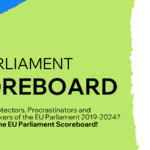Today, EU energy ministers have discussed sector integration as well as the state of play of the National Energy and Climate Plans (NECPs). Continued reliance on fossil gas and the fact that the plans are still falling short of climate ambition flies in the face of the European Parliament acting “Climate Emergency” last week.
During their exchange of views on sector integration, energy ministers still mentioned fossil gas as a transition fuel. However, just like oil and coal, fossil gas is a fossil fuel that has no place in a zero carbon society.
Demand for gas can be reduced by fully implementing policies that maximise energy efficiency in buildings, energy systems and industrial processes. In addition to savings, the full deployment of various renewable energy sources and sector integration are important pillars to move to a net zero emission society.
Veerle Dossche, EU Energy Policy Coordinator at Climate Action Network (CAN) Europe said:
“To remain in line with the objectives of the Paris Agreement and to move to a net zero emission society by 2040, the EU must phase out all fossil fuels and achieve a fully renewable energy supply as soon as possible. Fossil gas is not a bridge fuel, it’s a fuel of the past.”
Energy ministers also discussed the state of play of the draft National Energy and Climate Plans, which must be final by the end of this month. Despite some improvements since the European Commission issued its recommendations in June 2019, more work needs to be done to ensure that not only the current 2030 targets will be reached, but also that higher ambition on renewable energy, on energy savings and greater greenhouse gas emissions cuts by 2030 are reflected in the final plans. Aiming at a higher level of ambition than the current, low EU 2030 climate target will be key to bringing the bloc closer to the Paris Agreement goals.
Veerle Dossche added:
“By the end of the month EU countries must submit their final energy and climate plans. It is crystal clear that the quality of these plans will make or break the EU’s response to the climate crisis by 2030. The plans must assist the bloc to increase its 2030 climate target, phase-out all fossil fuels and speed up progress towards fully energy efficient and renewables-based economies.”
ENDS
Contact:
Nicolas Derobert, CAN Europe Communications Coordinator, nicolas@caneurope.org, +32 483 62 18 88
Note to editors:
The report “The clock is ticking: Insights into progress made by Member States so far in improving their draft NECPs” recently launched by CAN Europe sheds light on the progress Member States have made until now with improving their draft National Energy and Climate Plans (NECPs). This includes the extent to which they have implemented the European Commission’s recommendations issued in June this year, and whether they plan to go beyond those.
Climate Action Network (CAN) Europe is Europe’s leading NGO coalition fighting dangerous climate change. With over 160 member organisations from 35 European countries, representing over 1.700 NGOs and more than 47 million citizens, CAN Europe promotes sustainable climate, energy and development policies throughout Europe.

